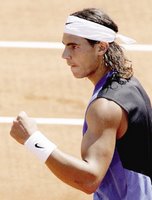Scud Locking On
Don't look now, but Mark Philippousis is looking like yet another comeback is bringing him back.
After dispatching the crafty Sebastien Grosjean (one of the more underrated players of the last decade) in three sets, the Scud has a date Thursday with Fernando Gonzalez. That's a perfect matchup for Mark, as Fernando is a guy who has none of the skills necessary to win on grass, nor the restraint to do anything but hit the ball as hard as he possibly can or keep his temper under control. Heck, he barely squeaked by Antony Dupuis in two breakers. After that, though, it gets a bit tenuous. Roddick most likely awaits in the quarterfinals unless Srichaphan can summon some of that 2002 magic again.
Don't forget about the other Aussie, Lleyton Hewitt, either. He's always played well at Queen's Club (three titles), and he's looks to be in fine form and healthy now. If he can get by the Beast, which is no small task, he'll have himself setup for a quarterfinal date with Nadal.
Speaking of Nadal, he was able to prove me wrong and beat Mardy Fish in straight sets today. I don't know if that means Rafa is finding his grass feet or if Mardy's still not at the level he can be, but it has to be an encouraging win for the Spaniard. He did lose with Feliciano Lopez to the dynamic duo of James Auckland and Jamie Delgado in doubles, but he's in this for the experience, not the dubs title. It's a disappointing result for Fish. I want him to succeed because of his committment to serve-and-volley and the fact he's coached by Todd Martin, but the man has some game to justify it. I refuse to believe he peaked in 2003. He won this year in Houston, and if he can produce some encouraging results in the hardcourt season (he's always played well in Cincinnati), he might have a breakthrough at the US Open.
The draw at the Stella Artois (say that five times fast) is holding up very nicely. We could have a quarterfinal of Nadal-Hewitt, Tursunov-Henman, Philippoussis-Roddick, and Blake-Ljubicic. If you're in the London area, I'd be getting tickets if I were you. It's going to be a good weekend.
Federer, meanwhile, continues his stampede to the consecutive grass court record and a fourth title at the Gerry Weber with a win over Rohan Bopanna. Not much to say here. Meanwhile, Kiefer withdrew with a wrist injury (presumably the same one that caused his retirement in France), allowing hanger-on Arnaud Clement to advance into the second round. Safin seems to be playing well; we'll see how his doubles adventure goes.
Meanwhile, Maria Sharapova is looking very much like the favorite for the ladies' title at Wimbledon. Her breezy win over Ahsha (gezundheit) Rolle gives her 11 straight victories in Nottingham. Most importantly, she's healthy right now, which is something most of the contenders can't claim.
After dispatching the crafty Sebastien Grosjean (one of the more underrated players of the last decade) in three sets, the Scud has a date Thursday with Fernando Gonzalez. That's a perfect matchup for Mark, as Fernando is a guy who has none of the skills necessary to win on grass, nor the restraint to do anything but hit the ball as hard as he possibly can or keep his temper under control. Heck, he barely squeaked by Antony Dupuis in two breakers. After that, though, it gets a bit tenuous. Roddick most likely awaits in the quarterfinals unless Srichaphan can summon some of that 2002 magic again.
Don't forget about the other Aussie, Lleyton Hewitt, either. He's always played well at Queen's Club (three titles), and he's looks to be in fine form and healthy now. If he can get by the Beast, which is no small task, he'll have himself setup for a quarterfinal date with Nadal.
Speaking of Nadal, he was able to prove me wrong and beat Mardy Fish in straight sets today. I don't know if that means Rafa is finding his grass feet or if Mardy's still not at the level he can be, but it has to be an encouraging win for the Spaniard. He did lose with Feliciano Lopez to the dynamic duo of James Auckland and Jamie Delgado in doubles, but he's in this for the experience, not the dubs title. It's a disappointing result for Fish. I want him to succeed because of his committment to serve-and-volley and the fact he's coached by Todd Martin, but the man has some game to justify it. I refuse to believe he peaked in 2003. He won this year in Houston, and if he can produce some encouraging results in the hardcourt season (he's always played well in Cincinnati), he might have a breakthrough at the US Open.
The draw at the Stella Artois (say that five times fast) is holding up very nicely. We could have a quarterfinal of Nadal-Hewitt, Tursunov-Henman, Philippoussis-Roddick, and Blake-Ljubicic. If you're in the London area, I'd be getting tickets if I were you. It's going to be a good weekend.
Federer, meanwhile, continues his stampede to the consecutive grass court record and a fourth title at the Gerry Weber with a win over Rohan Bopanna. Not much to say here. Meanwhile, Kiefer withdrew with a wrist injury (presumably the same one that caused his retirement in France), allowing hanger-on Arnaud Clement to advance into the second round. Safin seems to be playing well; we'll see how his doubles adventure goes.
Meanwhile, Maria Sharapova is looking very much like the favorite for the ladies' title at Wimbledon. Her breezy win over Ahsha (gezundheit) Rolle gives her 11 straight victories in Nottingham. Most importantly, she's healthy right now, which is something most of the contenders can't claim.
Labels: ATP
Continue reading--->


